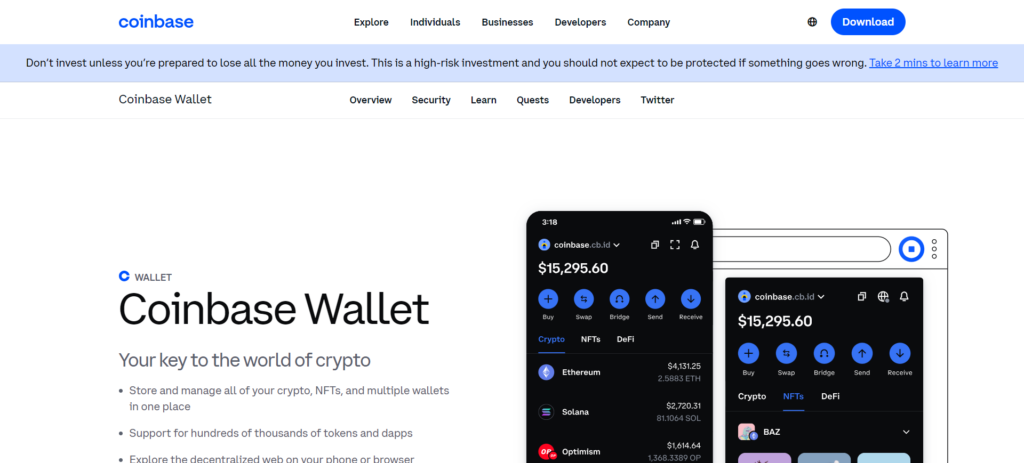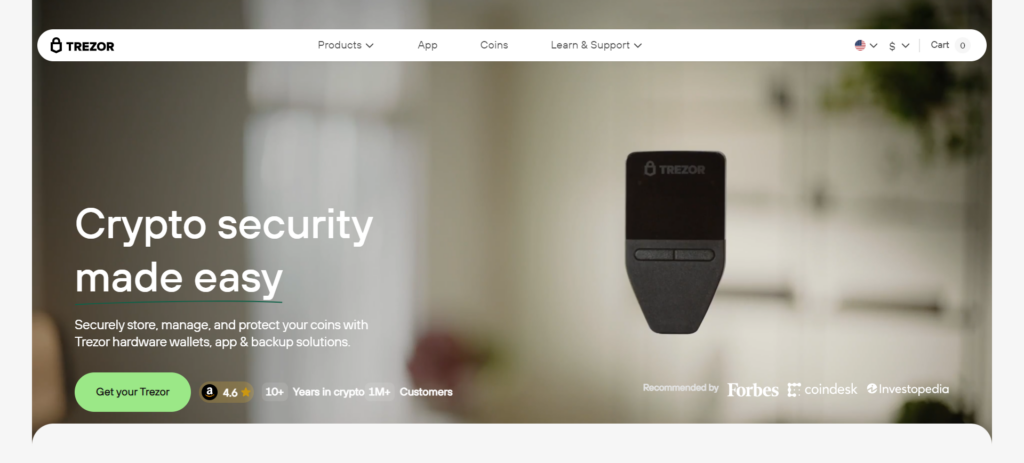Best Crypto Wallets in 2024: Secure Your Digital Gold
In 2024, with the landscape of cryptocurrency evolving rapidly, using the best crypto wallets is more crucial than ever. With advancing technology and increasing threats, having multiple top-notch wallets at your disposal helps provide security and flexibility for your investments.
What is a Crypto Wallet?
Crypto wallets serve as digital safes where users store their keys to access and manage cryptocurrencies like Bitcoin and Ethereum.
What are these keys?
A wallet generates a pair of cryptographic keys – a public and a private key. The public key is your wallet address that you can share with others to receive funds. The private key is a secret code you must keep secure, as it’s used to sign transactions and access your funds.
These keys can be stored in various ways, depending on the type of wallet, each with its own purpose and level of security.
Software Wallets: These are software applications that users can install on their computer (Desktop), smartphone (Mobile), or access via a web browser (Web). Desktop and Mobile wallets offer user-friendly interfaces and suit daily transactions. However, while convenient, web wallets may lack security due to online vulnerabilities.
Hardware Wallets: For maximum security, consider hardware wallets. These physical devices store keys offline, making them highly resistant to hacking attempts. They’re ideal for long-term storage.
Paper Wallets: A paper wallet involves writing down your private and public keys on a piece of paper. While highly secure if properly stored, the risk of loss or damage is significant.
Brain Wallets: These wallets rely on a memorized passphrase to generate keys. However, they’re not recommended for beginners due to the risk of forgetting the passphrase or being targeted by hackers.
Custodial Wallets: Crypto exchanges and third-party services offer custodial wallets. These wallets manage your keys on your behalf, providing convenience but potentially compromising security as you rely on the service’s safety measures.
How to Choose the Best Crypto Wallets?
When choosing the best crypto wallets, security should be your top priority. Hardware wallets, for instance, offer an unparalleled level of protection by keeping your private keys offline. Look for features like secure chip technology and PIN code access. Also, ensure the wallet provides robust backup and recovery options, such as seed phrases, which allow you to regain access to your funds in case of loss or damage.
For day-to-day transactions, software wallets are convenient. These wallets, available for desktop and mobile, offer easy access to your funds. Look for ones with user-friendly interfaces, support for various coins, and reasonable transaction fees. However, if you’re holding onto your cryptocurrencies long-term, consider cold storage options like paper or hardware wallets.
Lastly, don’t hesitate to mix and match wallets based on your needs. You might use a hardware wallet for long-term investments and a software wallet for everyday spending.
Best Crypto Wallets of 2024
1. Coinbase

Coinbase Wallet, launched in 2018, is a separate software wallet from the Coinbase exchange. It’s categorized as a hot wallet, meaning it’s suitable for regular use but not for storing large amounts of crypto long-term. As for security, the wallet offers biometric authentication and a secure passphrase backup feature.
It supports a wide range of cryptocurrencies, including Bitcoin, Ethereum, and ERC-20 tokens. The wallet is available as a mobile app for iOS and Android, but its desktop usage is limited to browser extensions for accessing decentralized applications (dApps).
Coinbase Wallet receives generally positive reviews for its user-friendly interface. However, some users have reported challenges with fund transfers and access.
Overall, Coinbase wallet is ideal for beginners. However, dedicated DeFi wallets may be more suitable for some.
2. Ledger

Founded in 2014 by Eric Larchevêque, Joel Pobeda, and Nicolas Bacca, Ledger is one of the best crypto hardware wallets in the industry. These are physical gadgets that keep your private keys safe offline, away from online risks.
It’s perfect for those who really care about keeping their crypto safe for the long haul. Ledger offers different models like the Ledger Nano S and Ledger Nano X that cost between $80-$150 or more, all packed with robust security features like special chips, PIN codes, and passphrases.
Plus, Ledger provides Ledger Live, an easy-to-use app to manage your crypto and link up with your Ledger hardware wallet. The hardware wallet is also compatible with popular software wallets and DEXs.
Although some people prefer open-source solutions like Trezor, Ledger’s solid reputation, regular updates, and support for a wide range of cryptocurrencies make it one of the best crypto wallets of 2024.
3. MetaMask

MetaMask earns its place on our list of best crypto wallets for its pivotal role in simplifying DeFi interactions. Launched in 2016, MetaMask started as a browser extension wallet tailored for Ethereum-based dApps. It’s now also available on mobile for both iOS and Android users.
Initially focused on Ethereum and ERC-20 tokens, MetaMask has expanded its reach to include other Ethereum-compatible networks like Ethereum Classic and Polygon.
MetaMask puts users in control by providing full access to their private keys. It also supports hardware wallets for added protection. With its user-friendly design and robust security features, MetaMask is a top choice for Ethereum fans and DeFi enthusiasts.
While there might be occasional negative feedback, often due to user errors or scams, MetaMask remains a highly recommended option for exploring DeFi and Ethereum-based dApps.
4. Trezor

Trezor makes it to our list of top crypto wallets as one of the original hardware wallet options. Created by SatoshiLabs in 2014, Trezor offers a secure way to keep your cryptocurrencies offline. Its lineup includes the Trezor One and Trezor Model T (with a touchscreen) within the price range of $80-180.
While some people say Trezor wallets can be a bit pricey, others appreciate the open-source nature of Trezor, which allows for community scrutiny, enhancing transparency and trust.
Trezor supports a wide range of cryptocurrencies, including major assets like Bitcoin, Ethereum, Litecoin, and various ERC-20 tokens. It’s also compatible with software wallets like Mycelium and Electrum, gets regular firmware updates, and is available on both desktop and mobile platforms. So, whether you’re protecting large sums of crypto or just starting out, Trezor wallets are a great option.
5. Crypto.com DeFi Wallet

The Crypto.com DeFi Wallet is a top choice among the best crypto wallets for its focus on providing users with a secure and versatile solution for managing decentralized assets. It debuted in 2020 as part of Crypto.com’s push into DeFi, offering non-custodial solutions.
This wallet is perfect for folks eager to dive into DeFi activities like yield farming, trading on decentralized exchanges, and liquidity pools. It supports a bunch of cryptocurrencies, from big ones like Bitcoin and Ethereum to various ERC-20 tokens and DeFi-specific assets, giving you plenty of options.
The Crypto.com DeFi Wallet uses features like mnemonic phrase backup and biometric authentication to keep your funds secure. Plus, it’s super easy to access on your phone, whether you’re using iOS or Android.
In short, if you’re looking for a safe and easy way to manage your crypto assets and explore DeFi, the Crypto.com DeFi Wallet is definitely worth considering.
6. Exodus

Exodus makes it to our list of best crypto wallets thanks to its user-friendly design, security features, and wide range of supported assets. It was founded in 2015 by Daniel Castagnoli and JP Richardson and started as a desktop wallet before becoming available on mobile for both iOS and Android.
It’s great for beginners and pros alike, with a simple interface that many users find easy to navigate. Exodus supports lots of cryptocurrencies, from big ones like Bitcoin and Ethereum to smaller ones and ERC-20 tokens.
Although it has decent security measures like encrypted private keys and fingerprint or face recognition on mobile, some people have doubts about how safe it really is. Still, if you’re after a straightforward and secure wallet that can handle many different cryptocurrencies, Exodus is definitely worth checking out.
7. Trust Wallet

Trust Wallet stands out as one of the best crypto wallets for its strong focus on keeping your digital assets secure while being easy to use. Founded in 2017 by Viktor Radchenko, Trust Wallet was initially focused on providing a secure DeFi wallet for Ethereum and ERC-20 tokens. Since its acquisition by Binance in 2018, it has expanded its support to include various cryptocurrencies like Bitcoin, Ethereum, and Binance Coin.
You’re in full control of your funds with Trust Wallet since it’s a non-custodial wallet, meaning you manage your own private keys. While there are mixed opinions about its safety, Trust Wallet uses industry-standard security features like backup phrases, PIN codes, and biometric authentication to protect your assets.
It’s perfect for folks who want to handle different cryptocurrencies and dive into DeFi directly from the Trust Wallet interface. Plus, it works smoothly on both iOS and Android devices, making it convenient for everyone.
8. KeepKey

KeepKey earns its place among the top crypto wallets as one of the first hardware wallets to hit the scene. It’s a wallet that won’t break the bank, costing around $80, making it a more affordable option compared to others like Trezor and Ledger.
KeepKey is easy to navigate with its big display and intuitive buttons interface, and it keeps your crypto safe with features like PIN protection and passphrase support.
While many like KeepKey for its cool design and user-friendly setup, some folks have had issues with software updates. They’ve noticed missing transaction history and balances not showing up correctly, especially for popular assets like Bitcoin.
Still, KeepKey gets a thumbs up from many in the crypto community for being a budget-friendly, user-friendly option with solid security features. If you’re after a wallet that’s easy on the wallet, KeepKey could be just what you need.
9. Safepal S1

SafePal S1 stands out among the best crypto wallets for its mix of low-cost, security, and easy-to-use features. Created by SafePal, a subsidiary of Binance, it hit the market in 2019 with a starting price of $49.
Its small size and touch screen make it simple to use, and its robust security features, like encrypted chip technology and offline key generation, keep your crypto safe from hackers.
SafePal S1 can handle lots of different cryptocurrencies, and it’s always getting updates to work with new ones. You can manage your coins right from your phone with the SafePal app, which works on both iOS and Android.
While SafePal has generally positive reviews, some people criticize its compatibility issues with certain platforms and limited trading pairs. Additionally, mixed opinions on build quality and battery life highlight areas for improvement.
Overall, though, it’s a good choice for anyone looking for a wallet that’s affordable and reliable.
10. Electrum

Electrum has secured its place among the best crypto wallets as one of the oldest and most trusted Bitcoin wallets since its launch in 2011 by Thomas Voegtlin.
Known for its strong security and simple design, people trust it due to its non-custodial nature. Moreover, Electrum is open-source, meaning anyone can check its code and make improvements. It’s also great for privacy and security, supporting multi-signature wallets that need more than one signature for transactions. However, some users caution against using Electrum on Windows systems due to security concerns, suggesting Linux machines instead.
Even though Electrum is mainly for Bitcoin, it can also work with other cryptocurrencies using external plugins. It works with hardware wallets like Trezor and Ledger too, which adds additional security by letting you sign transactions offline.
Overall, Electrum remains a top choice for those who want a secure and customizable wallet.
FAQ
Are cold wallets 100% safe?
No, cold wallets are not 100% safe. While they offer a high level of security by storing cryptocurrencies offline, thereby reducing the risk of online hacking attempts, they are not immune to all forms of risk. Users must still be cautious about physical threats such as theft, loss, or damage to the hardware where the wallet is stored.
Additionally, if the user loses the private keys or recovery phrases associated with a cold wallet, they could permanently lose access to their funds. Proper security measures and backups are essential to mitigate these risks.
What is the best cold wallet for 2024?
Both Ledger and Trezor are top picks for best cold wallets in 2024 because they offer strong security and support a wide range of cryptocurrencies. But the best choice for you depends on your specific needs. Consider what’s most important to you: the security features, the types of cryptocurrencies you want to hold, how easy the wallet is to use, and your budget.
Are hot wallets risky?
Hot wallets are more exposed to risks because they’re always connected to the internet. This makes them vulnerable to hacking, phishing, and malware attacks. They’re handy for quick access and trading, but their safety really depends on the security measures taken by both the service providers and the users themselves.
To stay safe, it’s important to use strong passwords, enable two-factor authentication, and watch out for suspicious activities. It’s also a good idea to keep only a small amount of your crypto in a hot wallet and store the rest in a more secure cold wallet.
What is the most trusted crypto wallet?
When it comes to trusted crypto wallets, Ledger, Trezor, and Coinbase Wallet stand out. Ledger is celebrated for its top-notch security with a secure chip, while Trezor is favored for its open-source security that supports many cryptocurrencies. Coinbase Wallet is great for beginners, offering easy use and strong security features like two-factor authentication.
Always consider your own needs and do some research to find the best fit.
Is Trezor or Ledger better?
Choosing between Trezor and Ledger boils down to what you value most. Ledger uses a secure chip for an extra safety layer, making it slightly more tamper-resistant, and offers Bluetooth connectivity for mobile use with the Nano X model. Trezor stands out for its open-source software, offering transparency and a user-friendly interface with a touchscreen on the Model T.